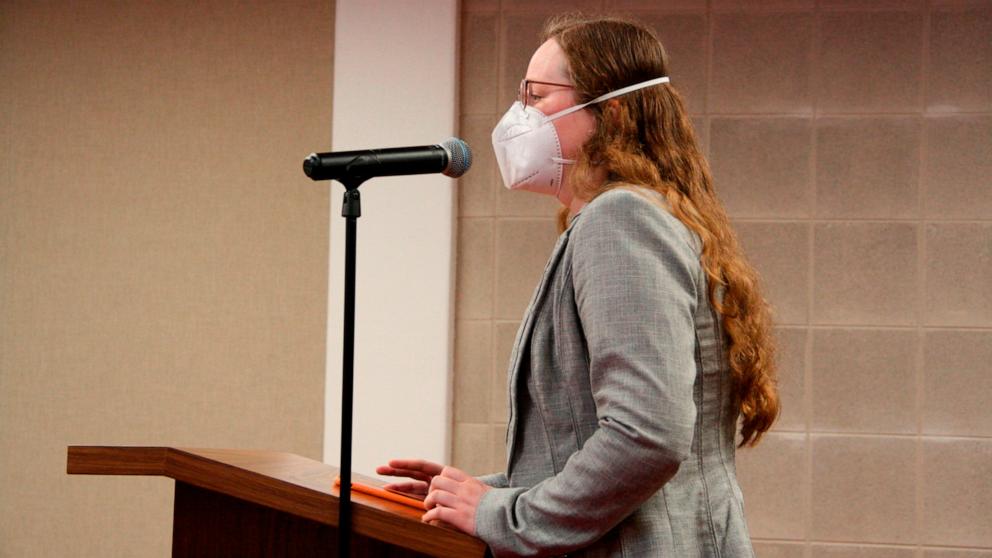North Carolina residents with disabilities say mask restrictions under consideration in the state Legislature could make parts of their communities more inaccessible and once again force them into isolation.
“This law tells them you are not welcome in our community and that we do not value your presence in order to accommodate the need to wear a mask,” Tara Mueller, policy attorney at the North Carolina Disability Rights Union, told ABC News.
House Bill 237, dubbed the “Unmasking Rioters and Criminals” bill, would repeal COVID-19 pandemic exemptions that allow people to wear masks in public. The bill allows exceptions for holiday costumes, ceremonies and ceremonies, theatrical performances, gas masks, or employment-based use, but it would take away the right to wear a mask to ensure the “physical health or safety of the wearer or others.”
Rep. Erin Pare urges the North Carolina House of Representatives not to agree to a bill that would repeal mask mandates, May 22, 2024, at the Capitol in Raleigh, N.C. Meika Seminella/AP
North Carolina lawmakers are currently debating whether to move forward with eliminating the exemption, a measure that faced opposition in the House but recently passed the Senate. Meanwhile, residents with disabilities and their families are waiting in the wings, worried about how this will affect their futures.
The bill aims to curb the use of masks to conceal a suspect’s identity.
As protests against the Israeli-Hamas war continue, many demonstrators have been seen wearing masks and supporters have criticized their use. “It’s time to at least slow down the madness, even if it literally won’t stop,” Republican bill sponsor Buck Newton said, according to Raleigh news outlet WRAL.
Similar restrictions are being considered in other states, with some including New York, Ohio and Florida enacting mask-wearing restrictions.
But disability advocates say such restrictions infringe on people with disabilities’ ability to protect themselves and others.
Public comment speaker Simone Hetherington urges lawmakers not to pass a mask bill during a State Senate Rules Committee meeting at the State Capitol in Raleigh, North Carolina, May 15, 2024. Makiya Seminarella/AP
Brian Dooley, a North Carolina resident who has cerebral palsy and asthma, told ABC News that he hadn’t left his house for a year, starting when the pandemic began, adding, “That’s not an exaggeration.”
He was worried about the possibility of his respiratory infection worsening: People with asthma and cerebral palsy are at higher risk for severe complications from COVID-19, according to the Mayo Clinic.
Dooley said that because he has a speech impediment, it’s difficult for him to speak to others while wearing a mask, so he and those around him often wear masks to protect him.
He said the disability community doesn’t ask for much. “They just want to contribute to the community, just like anyone else.”
Mueller’s group said people are worried that going to public health facilities, workplaces, grocery stores or even just walking down the sidewalk could mean they face police or others trying to enforce mask-wearing restrictions. Those concerns come from people with a range of experiences, including those who are immunocompromised, undergoing chemotherapy or have received organ transplants.
Katie Nease, CEO of disability advocacy group The Arc of the United, said wearing a mask remains a serious and important issue for many people concerned about their health.
“You wouldn’t feed a child with diabetes something that’s going to make them sick. You wouldn’t feed a child with a life-threatening peanut allergy peanuts. We have to recognize that some children need this protection for their basic health,” Nease said.
Mueller said he feels the ban is a setback in making the world a more accessible place for everyone, not just people with disabilities or immunocompromised. For example, millions of Americans are still feeling the effects of COVID-19 and long COVID. More than 100 million cases of COVID have been recorded in the United States, and approximately 63 million U.S. adults have or have had long COVID.
“We have made great strides to enable people with disabilities to participate in our community in ways that were not possible before, and wearing a mask is one way that people can feel safe participating in their community when they otherwise could not,” Mueller said.
Felicia M. Naamsen of the National Organization for People with Disabilities knows firsthand the impacts of long COVID. She said the trend away from public health and safety is concerning after she had COVID and developed asthma, fatigue and worsening heart disease.
“I still have some other health issues … there’s no guarantee they’ll go away,” Nurmsen said.
Nurmsen said the pandemic has led to a wide range of efforts toward accessibility for all, including personal and public health mask-wearing, remote work options, and increased delivery options. From automatic doors to escalators, many things that make life easier for everyone are disability accessibility features, she noted.
“If you see someone on the street wearing a mask, or if you go into a store and someone is wearing a mask, you can’t assume that they don’t have a disability, because you don’t know,” Nurmsen said. “It can’t be an all-or-nothing proposition, because we have to think about the whole population.”

